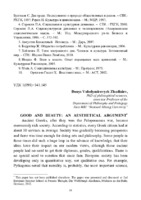Добро та краса: естетичне обгрунтування
| dc.contributor.author | Zhadiaiev, Denys Volodymirovych | |
| dc.date.accessioned | 2019-06-18T11:35:47Z | |
| dc.date.available | 2019-06-18T11:35:47Z | |
| dc.date.issued | 2017 | |
| dc.identifier.citation | Жадаєв Д. В. Добро та краса: естетичне обґрунтування / Д. В. Жадаєв // Гуманітарне знання у викликах сучасності : зб. наук. пр. – Дніпро. : НГУ, 2017. – С. 7-18. Англ. мовою | ru_RU |
| dc.identifier.uri | http://ir.nmu.org.ua/handle/123456789/154115 | |
| dc.description.abstract | Ancient Greeks, after they won the Peloponnesus war, became enormously rich society. According to statistics, every Greek citizen had at about 10 servants in average. Society was gradually becoming prosperous and there was time enough for doing arts and philosophy. Some people in those times did such a huge leap in the advance of knowledge, that their ideas have their impact on our modern views, although those ancient people had no need to get their diplomas, grades, qualifications. There is no special need to mention that since then European society has been developing only in quantitative way, not qualitative one. | ru_RU |
| dc.language.iso | en | ru_RU |
| dc.subject | добро | ru_RU |
| dc.subject | эстетика | ru_RU |
| dc.subject | естетика | ru_RU |
| dc.subject | істина | ru_RU |
| dc.subject | истина | ru_RU |
| dc.title | Добро та краса: естетичне обгрунтування | ru_RU |
| dc.type | Article | ru_RU |
| dc.identifier.udk | 101/141(09) | ru_RU |

